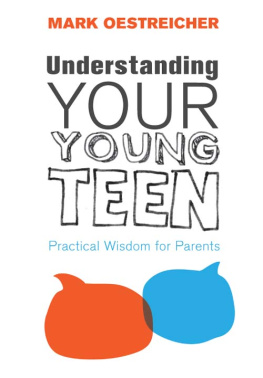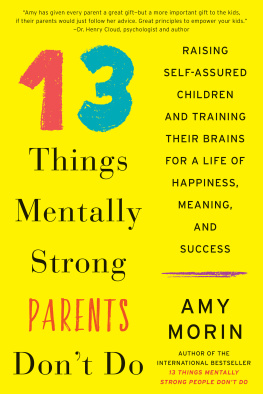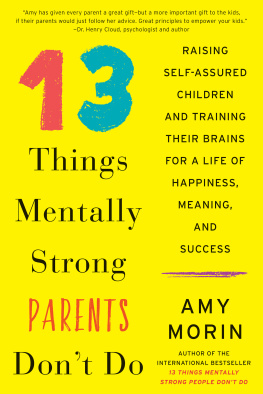ROUTLEDGE LIBRARY EDITIONS: CHILDREN AND DISABILITY
Volume 10
PARENTS & YOUNG MENTALLY HANDICAPPED CHILDREN
PARENTS & YOUNG MENTALLY HANDICAPPED CHILDREN
A Review of Research Issues
HELEN MCCONACHIE
First published in 1986 by Croom Helm Ltd
This edition first published in 2016
by Routledge
2 Park Square, Milton Park, Abingdon, Oxon OX14 4RN
and by Routledge
711 Third Avenue, New York, NY 10017
Routledge is an imprint of the Taylor & Francis Group, an informa business
1986 Helen McConachie
All rights reserved. No part of this book may be reprinted or reproduced or utilised in any form or by any electronic, mechanical, or other means, now known or hereafter invented, including photocopying and recording, or in any information storage or retrieval system, without permission in writing from the publishers.
Trademark notice: Product or corporate names may be trademarks or registered trademarks, and are used only for identification and explanation without intent to infringe.
British Library Cataloguing in Publication Data
A catalogue record for this book is available from the British Library
ISBN: 978-1-138-96230-9 (Set)
ISBN: 978-1-315-64761-6 (Set) (ebk)
ISBN: 978-1-138-12443-1 (Volume 10) (hbk)
ISBN: 978-1-315-64789-0 (Volume 10) (ebk)
Publishers Note
The publisher has gone to great lengths to ensure the quality of this reprint but points out that some imperfections in the original copies may be apparent.
Disclaimer
The publisher has made every effort to trace copyright holders and would welcome correspondence from those they have been unable to trace.
The publishers would like to make it clear that the views and opinions expressed, and language used in the book are the authors own and a reflection of the times in which it was published. No offence is intended in this edition.
PARENTS & YOUNG MENTALLY HANDICAPPED CHILDREN
A REVIEW OF RESEARCH ISSUES
HELEN McCONACHIE
1986 Helen McConachie
Croom Helm Ltd, Provident House, Burrell Row,
Beckenham, Kent, BR3 1AT
Croom Helm Australia Pty Ltd, Suite 4, 6th Floor,
64-76 Kippax Street, Surry Hills, NSW 2010, Australia
British Library Cataloguing in Publication Data
McConachie, Helen
Parents and young mentally handicapped children: a review of research issues.
1. Mentally handicapped children Education 2. Parent and child 3. Education, Preschool
I. Title
371.928 LC4602.5
ISBN 0-70994608-2
Brookline Books, PO Box 1046,
Cambridge, MA 02238
Library of Congress Cataloging-in-Publication Data
McConachie, Helen.
Parents and young mentally handicapped children.
Bibliography: p.
Includes index.
1. Mentally handicapped children Education United States. 2. Mentally handicapped children United States Family relationships. 3. Special education literature.
I. Title. [DNLM: 1. Education of Mentally Retarded.
2. Family. 3. Mental Retardation. WS107.5.R5 M478p]
LC4631.M33 1986 371.928 86-13383
ISBN 0-914797-28-X (Brookline Books)
Printed and bound in Great Britain by
Biddles Ltd, Guildford and Kings Lynn
CONTENTS
For Ian
Peter Mittler, Professor of Special Education at Manchester University, read the versions of this book when it still formed part of a Ph.D. thesis. His advice and enthusiasm were invaluable to me.
Peggy Jones is much more than an extraordinarily skilled typist. Her commitment and personal friendship to me made the book possible.
The review of literature was undertaken while I was Research Fellow at the Hester Adrian Research Centre, Manchester University, and Senior Lecturer in Psychology in the Speech Pathology and Therapy Section, Manchester Polytechnic. To my colleagues in those departments who gave encouragement and help I offer my belated thanks.
Background
Over the past fifteen years or so, increased awareness of the difficulties facing families of young mentally handicapped children has been coupled with the creation of more coherent services for families. The philosophy behind these service developments has reflected a trend toward normalisation, that is promoting conditions which will allow mentally handicapped people to live as ordinary a life as possible. It also implies a realisation of mentally handicapped peoples capacity for developing skills, given appropriate conditions. The role of parents in fostering their childrens early development has obviously been seen as of central importance.
One approach which has received considerable attention has been the involvement of parents in teaching their young mentally handicapped children. Its rapid development was boosted by the view that parents of handicapped children had been underestimated by professionals in the past, and that increased consideration should be given to practical rather than to therapy-oriented intervention (Wolfensberger, 1967). Published studies soon showed that parents could learn the principles and techniques of behaviour modification, and successfully change problem behaviour in their children and teach them new skills (e.g. as reviewed by Berkowitz and Graziano, 1972; Johnson and Katz, 1973; and ODell, 1974). More recent and more comprehensive programmes for young handicapped children have been constructed around the sequences of normal development (e.g. Bricker and Bricker, 1976; Shearer and Shearer, 1976). Renewed impetus came from the collective findings of early intervention programmes for handicapped and disadvantaged children in the USA (Bronfenbrenner, 1976; Lazar and Darlington, 1979). Parent involvement was found to be an essential catalyst for maintaining the effects of educational programmes; the setting of programme goals for or with parents was strongly related to positive outcomes for children even several years later.
Recent research in parent involvement has explored many different issues; for example, programme characteristics such as how much intervention is necessary (e.g. Heifetz, 1977a, b; Sandow and Clarke, 1978; Cheseldine and McConkey, 1979), the problems posed by children of differing levels of severity of handicap (e.g. Wishart, Bidder and Gray, 1980) and follow-up of the maintenance and generalization of learning (e.g. Baker, 1977; Gardner, 1983). Service philosophies are undergoing change in response to parents demands, from parent training to partnership (Mittler and McConachie, 1983) and thus are being challenged to develop flexibility and responsiveness to individual differences amongst parents and families.
Scope of the book
The primary aim of the book is to draw together a coherent conceptual framework for the involvement of parents in teaching their young mentally handicapped children. The strategy adopted is to review and analyse available literature about the families of handicapped children, covering a wide sweep of issues and ideas. As described above, parental involvement in teaching has become an apparently successful and widely-supported intervention strategy in helping families. However, very many questions remain to be answered about its appropriate future development. Which parents respond most enthusiastically to involvement in teaching, and which do not? How does it affect other family members? Is there time in the day for teaching? Are parents not teachers already? How may parents feelings about their handicapped child be affected?











